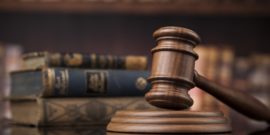Because original meaning depends on facts, it is, in principle, ascertainable, unlike the personal values of judges.
Toobin on Justice Thomas’ Alleged Arrogance
While I was on vacation, Jeffrey Toobin published a hit piece on Clarence Thomas in the New Yorker entitled “Clarence Thomas Has His Own Constitution.” Sadly, the piece is filled with problematic criticisms of the justice.
Happily, the piece starts with a bit of a defense of Thomas against criticisms. While many people criticize Thomas as either a Scalia clone or not hard working, Toobin acknowledges that these charges are not true. In fact, Toobin notes that Thomas is by far the most active writer on the Court, with twice as many opinions as his nearest competitor on the Court. Moreover, many of Thomas’ opinions are solo opinions that were not joined by Scalia.
But that leads Toobin to his criticism of Thomas. Toobin in essence claims that Thomas is an arrogant conservative, placing his own views over those of his fellow justices and the Court generally (although Toobin does not use the term arrogant). As Toobin puts it:
It’s an act of startling self-confidence, but a deeply isolating one as well. Even his ideological allies, who mostly come out the same way on cases, recognize that they must dwell within the world that their colleagues and predecessors created. Thomas, in contrast, has his own constitutional law, which he alone honors and applies.
While I agree with Toobin that Thomas is the justice pursuing originalism most consistently on the Court, I don’t agree with the implicit criticisms that Toobin asserts.
To begin with, if Thomas were a liberal, pursuing a liberal vision in sole dissents, most commentators and perhaps Toobin would applaud his independent and his vision of justice. He might be called the great dissenter. But since Thomas is a conservative/libertarian, no such applause.
Toobin claims that Thomas is idiosyncratic, but that word (suggesting nonseriousness) is inappropriate. Thomas is following one of, if not the leading theory of constitutional interpretation—constitutional originalism. It is true that most other members on the Court are not, but that suggests the unrepresentativeness of the Court. As originalism has gained significantly in prominence over the last decade, the appointments have been made by President Obama who has eschewed selecting an originalist justice. If a person more open to originalism were to become President, it is possible we would see another consistent originalist on the Court.
Toobin criticizes Thomas for refusing to live with the Court’s precedents that even his conservative allies recognize they must apply. But that is not right either, even assuming (which is not entirely clear) that Thomas rejects most precedent. First, Thomas has more influence this way—by consistently applying an interpretive approach, he publicizes and furthers that approach and effectively criticizes the Court’s problematic jurisprudence.
Second, it is simply not true that the liberal justices “live with” the Court’s precedents. Frequently, they live with the liberal precedents, while seeking to overturn the conservative ones. The most radical change in the Court’s history was the liberal New Deal. The second was probably the liberal Warren Court. And even today, as Ruth Bader Ginsburg’s outbursts make clear, the liberal justices are plotting the overturning of Citizens United and Heller.
Other criticisms of Thomas in the article are also off base. Yes, Thomas would be unlikely to give his seat to a Democratic President, but that hardly distinguishes him from the other justices. The only ones who have given their seats to a President of the other party are Stevens and Souter, both of whom were liberal or nominal Republicans. Toobin also criticizes Thomas for saying that “since the Presidency of Franklin D. Roosevelt, the Court’s interpretation of the Constitution has become an ‘unworkable morass of special exceptions and arbitrary applications.’” Notice that Toobin does not specifically deny Thomas’s charge. I will turn to this aspect of Justice Thomas’ views in a future post.


